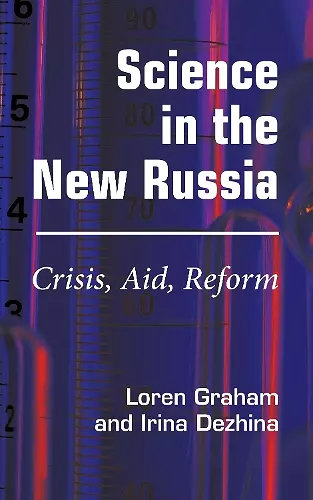Science in the New Russia
Crisis, Aid, Reform
Loren R Graham author Irina Dezhina author
Format:Paperback
Publisher:Indiana University Press
Published:28th May '08
Currently unavailable, and unfortunately no date known when it will be back

The first comprehensive look at changes in Russian science since the collapse of the Soviet Union
The Russian science establishment was one of the largest in the world, boasting many Nobel prizes, a world-leading space programme, and schools in mathematics, and physics. This book tells the story of the near collapse of Russian science and of subsequent domestic and international efforts to reform and re-energize scientific activity in Russia.
The Russian science establishment was one of the largest in the world, boasting many Nobel prizes, a world-leading space program, and famous schools in mathematics, physics, and other fields. However, when the Soviet Union collapsed in 1991, the major financial supports for the scientific community were eliminated, with resulting "brain drain." The subsequent expansion of capitalism and globalization revealed that Russian science was ill adapted to compete with other countries in high technology. Science in the New Russia tells the dramatic story of the near collapse of Russian science in the mid-1990s and of subsequent domestic and international efforts to reform and reenergize scientific activity in Russia.
The 1991 collapse of the Soviet Union precipitated one of the greatest crises in the history of science. The Soviet Union had heavily supported science, but the new Russian state had few funds to do so. Graham (MIT and Harvard), the leading historian of modern Russian science outside Russia, and Dezhina (Institute of World Economy and International Relations, Moscow), a leading research scholar, collaborate to tell how Russian scientists, the Russian state, Russian institutions, and foreign funding agencies interacted to help Russian science recover from virtual bankruptcy. The story is more complex than merely finding new funds, difficult though that was. Science in the Soviet Union had been very authoritarian, but not especially productive. Science in the US, Germany, and France was more democratic and more productive, and those three models provided guidance for restructuring Russian science to provide scientists with more freedom so they could become more productive. The social structure of science underwent a revolution, with a few powerful scientists becoming losers and many formerly restricted scientists becoming winners of better working conditions, if not better pay. This remarkable story is told concisely and clearly with ample documentation. A valuable resource for historians of modern science and post-Soviet Russia. Summing Up: Highly recommended. Upper-division undergraduate through professional collections.F. N. Egerton, Emeritus, University of Wisconsin--Parkside, Choice
"Overall, this is an exceptionally thorough and useful book, which highlights the remarkable progress that has been made in Russian science in less than 20 years; illuminates the very real potential of mutually beneficial international cooperation; provides a clear roadmap of the equally real challenges that remain in science policy and professional practice..." —Mark S. Johnson, Colorado College, Issues in Science & Technology
"A thoroughly researched, carefully reasoned analysis of an important subject... The authors have a sure sense of how science functions both in Russia and in various advanced Western countries.... an important study." —Bruce Parrott, Johns Hopkins University
"This book will be of great interest not only to scholars in the area of Russian and Soviet studies, but also to anyone who is involved in poicy-making in the sciences—especially in the Eastern bloc. these readers will find many recommendations on how to modernize the science industry and make it more effective." —Slavic and East European Journal
"This remarkable story is told concisely and clearly with ample documentation. A valuable resource for historians of modern science and post-Soviet Russia.... Highly recommended." —Choice
"This book... provides an interesting and useful analysis of the development of research activities in Russia." —Europe-Asia Studies
"This book will be of interest not only to scholars in the area of Russian and Soviet studies, but also to anyone who is involved in policy-making in the sciences—especially in the Eastern bloc. These readers will find many recommendations on how to modernize the science industry and make it more effective." —Slavic and East European Journal
"Graham and Dezhina have produced a very insightful volume that will prove invaluable to those contemplating science policy in the region over the next decades." —Michael D. Gordin, Princeton University, Slavic Review
"... [this book] supports the authors' unmatched erudition with a wealth of statistical data and thorough research, and produces penetrating analysis and stimulating conclusions.... would be of great interest not only to historians and sociologists of science and students of post-Soviet Russia, but also to science policy makers in many countries going through political and economic transition." —Slava Gerovitch, M.I.T., The Russian Review
ISBN: 9780253219886
Dimensions: unknown
Weight: unknown
216 pages